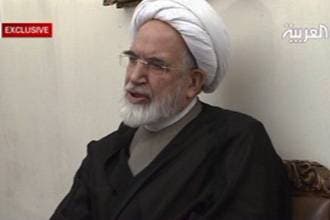Iran’s regime feeds on crises: Karroubi
Says Guard members displeased with the regime
Iranian opposition leader Mehdi Karroubi in an exclusive interview with Al Arabiya TV aired Sunday said the regime in Tehran depends on creating international and domestic crises to safeguard its existence and continuation.
"The Authority considers that the continuation of its rule depends on creating crises ... it stirred a lot of problems inside universities and in various unions and within clergy as well," Karroubi told Al Arabiya TV.
“The current conditions are very tense and very difficult. It has never been like this during the last 30 years of the revolution,” he added.
Karroubi said when he and reformist leader Mir-Hossein Mousavi, and even Maj. Gen. Mohsen Rezai decided to run for Iran's tenth presidential election on June 12, 2009, they did not expect vote rigging to take place and usher in an era of political turmoil.
Rezai was seen to be much closer to the regime than other candidates having served as former Commander of Iran’s elite Islamic Revolutionary Guards Corps (IRGC) from 1981 to 1997. The IRGC, and in particular its Qods (Jerusalem) Force, are tasked with liberating Jerusalem through Baghdad in stark contrast to the country’s regular armed forces which are purely for defending the country against foreign attacks.
The current conditions are very tense and very difficult. It has never been like this during the last 30 years of the revolutionIranian opposition leader Mehdi Karroubi
Responsible parties
Karroubi said that activities of the Revolutionary Guard and intelligence services continue to fuel the crisis. "Things now are in the hands of the Revolutionary Guard and the ministry of intelligence; of course I do not mean everybody under those departments is responsible, but some parties are,” he added.
Karroubi revealed that the majority of members in the Rev. Guard and in the intelligence are displeased with the current conditions.
"Following the Islamic Revolutions we experienced conflicts, but never something like this. What current authorities do is something illogical and unacceptable."
He said they authorities avoid the implementation of laws. "The situation has become worse after these people disobeyed the law and ignored the constitution”
The opposition leader attributed “constitutional violations” to what he described as the weakening of parliament. “This is what happens when you weaken the parliament,” he said.
“Even if the parliament wants to work, this man (President Ahmadinejad) who likes to act alone will obstruct its work. If I were in the parliament I would not allow such behavior.”
(Written by Mustapha Ajbaili)
